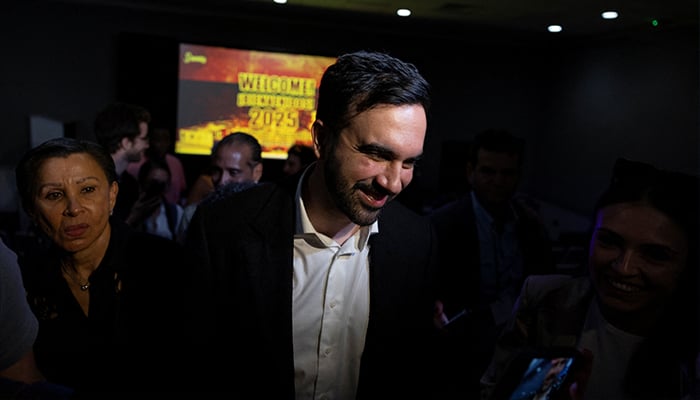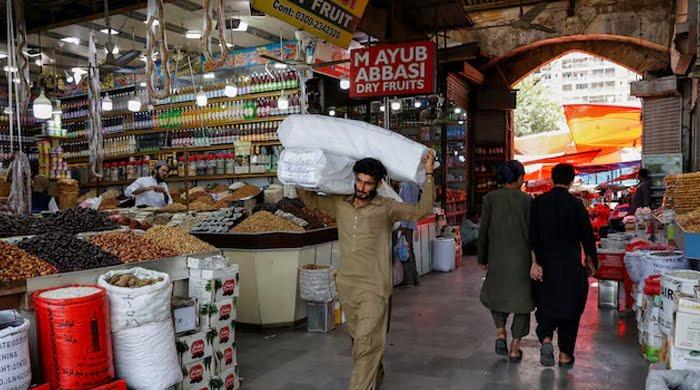Space for change
Zohran Kwame Mamdani’s victory to become New York mayor proves yet again that space for change continues to exist
November 08, 2025

Zohran Kwame Mamdani’s victory to become New York mayor proves yet again that, even in a vitiated environment of ‘Trumpian’ proportions, space for change continues to exist. All that is needed is someone to ignite the dream.
Mamdani did it by employing the best means available in the modern world: the use of the ballot. But when the sanctity of the ballot is infringed, as it happens so often in our surroundings, the perpetrators of the status quo are strengthened and violence begins to creep in.
Pakistan is a classic case of suffering from the consequences of such an infringement. With space for change blocked through the use of undemocratic means and the voice of the institutions silenced by forcing legislation through an assembly shorn of people’s electoral trust, Pakistan has been turned into a pond with stagnant water.
It starts emitting a stench after some time. The more one persists with the same, the more of the same one will get.
The traditional constraints impeding Pakistan’s growth have strangulated the country in their tentacles. This encapsulation encompasses the role played by the beneficiary elite, the fake liberals and the religiosity-laden classes inimical to the need for moving on in an independent environment free of strictures and dogmas. This vicious plan has been aided and abetted by the judiciary and other state institutions.
Simultaneously, there is an alarming disconnect within progressive forces as well as their relationship with the outside elements, which has pushed them into a pothole of inaction.
They seem to be more concerned with manipulating the diminishing space they are left with, while the battle of ideas has been consigned to the background. In the process, they are fast losing hold of a position of ideological strength that gave them legitimacy and that could have propelled them to generate hope in the future.
As the descending dark becomes darker, it is only hope that will cultivate the strength not only to fight the undemocratic onslaught, but also create space for light to filter in. It is not something that we should only expect in the future as the culmination of our struggle.
On the contrary, there is a pressing need for hope now, which can guide us to embrace the ideal of freedom. Like Mamdani said in his victory speech: “Tonight, we have spoken in a clear voice: hope is alive – hope over tyranny, hope over big money and small ideas, hope over despair”.
Hope does not die. It always stays alive. It resonates across mountains, valleys and plains and across every nook and crevice. It resonates across dark clouds and bright sunshine. It resonates across moments of despondency and flashes of resurgence. It lifts you from the dungeons of darkness and exposes you to the beneficence of tomorrow. It is like an undying feeling. It regenerates you.
But there are moments when one’s faith in hope is brutally tested. This happens when the decision-making process is not rooted in pragmatic appraisals of the challenges faced and a failure to realise the urgent need for a drastic change of course.
Unfortunately, it appears that we have reached a point of stagnation where we are rendered unable to see the seething discomfort across the sprawling populace, who feel that they do not have faith in the ability and capability of the people running state affairs.
They often talk about the sinister manner in which the last election was stolen, with leaders enjoying their mandate disabled from taking charge of the country.
This feeling of deprivation has grown deeper over time, particularly due to the existing system's inability to provide relief to the people and build hope for the future. This is amply reflected in the unprecedented quantum of exodus that has taken place in the last three years, owing to people’s loss of faith in their future if they continued living here. This would send alarm bells ringing in any other country — but not here. In fact, some among the ruling elite have even encouraged more people to leave. That is like a cruel joke.
We are at a low ebb in our history, and there are many reasons why it is so. The decline is embedded in an unbending mindset and a deeply dug-in fear among the beneficiary elite of the loss of their political empire, which is their bastion for piling up illicit billions from this country to invest in properties and businesses in distant lands. The criminally crafted system that is practised here only facilitates this ongoing daylight robbery.
The palpable frustration among the people has generated fear in the ruling echelons. That is why they are devising new techniques to keep the people under their tight stranglehold.
Its latest manifestation is the unveiling of the proposed 27th Amendment, which is said to cover the establishment of a constitutional court, revival of the executive magistracy system, transfer of judges, amending the NFC Award with respect to provincial share, amending Article 243, passing control of the departments of education and population to the federation, and appointments in the Election Commission.
The repertoire addresses some sensitive issues that require careful study and appraisal before moving forward.
The proposed amendments can potentially impact the existing balance of power between the federation and the provinces. This will also amount to a partial reversal of the 18th Amendment, which could spur some contentious debate. All this has been envisioned to further tighten the grip of the manipulators over the state's affairs, so that any room for discordant voices is completely snuffed out. It does not reflect a democratic mindset, but rather one that seeks total control.
If such far-reaching changes are to be enacted in the constitution, these should go through the democratic process contained in the statute book. However, as in the past, it is feared that these will be bulldozed through an unrepresentative parliament without any thorough debate. This approach will further weaken the federation.
We need space for change in our approach and our mindset. The focus should shift from control to consultation, from individualised profit for a few to ensuring the welfare of the entire populace, from dictatorial language to a democratic spirit, from expressing disdain for the deprived and downtrodden to respecting their lives and dignity.
Mamdani has led as peaceful a revolution as one can be. Creating space for change in our midst is an absolute necessity, as otherwise, the state will continue to falter and become weaker. It is within us to make it happen — and we must.
The writer is a political and security strategist and the founder of the Regional Peace Institute. He is a former special assistant to former PM Imran Khan and heads the PTI’s policy think-tank. He tweets @RaoofHasan
Disclaimer: The viewpoints expressed in this piece are the writer's own and don't necessarily reflect Geo.tv's editorial policy.
Originally published in The News











